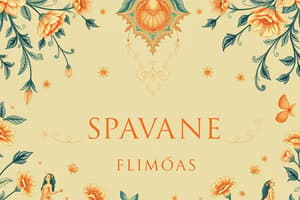Podcast
Questions and Answers
Why do you have my red purse?
Why do you have my red purse?
- ¿Por qué no tienes mi cartera roja?
- ¿Por qué tienes mi cartera roja? (correct)
- ¿Cuándo tienes mi cartera roja?
- ¿Dónde está mi cartera roja?
José and I never wear dresses?
José and I never wear dresses?
José y yo nunca usamos vestidos
My boyfriend always wears red t-shirts.
My boyfriend always wears red t-shirts.
mi novio siempre usa camisetas rojas
Do we need to buy t-shirts for Roberto?
Do we need to buy t-shirts for Roberto?
How many red purses do you want to buy?
How many red purses do you want to buy?
Do you need new shoes again?
Do you need new shoes again?
Camila and Ana, what shoes are you wearing today?
Camila and Ana, what shoes are you wearing today?
I want to eat a sandwich at the cafe.
I want to eat a sandwich at the cafe.
The town.
The town.
The town has two supermarkets.
The town has two supermarkets.
Far.
Far.
Is the supermarket far from here?
Is the supermarket far from here?
Where is the cafe?
Where is the cafe?
The airport.
The airport.
To the left.
To the left.
To the right.
To the right.
Bus stop.
Bus stop.
The bus stop is to the left.
The bus stop is to the left.
The subway station has a lot of trains.
The subway station has a lot of trains.
Why don't you want to take the subway?
Why don't you want to take the subway?
Is the hotel to the right or to the left?
Is the hotel to the right or to the left?
The suitcase is to your left.
The suitcase is to your left.
I am at the town cafe.
I am at the town cafe.
The hotels are on Aguilar street.
The hotels are on Aguilar street.
Pedro and I eat sandwiches on the beach.
Pedro and I eat sandwiches on the beach.
Afternoons with friends are fun.
Afternoons with friends are fun.
We write on the computer.
We write on the computer.
Daniel and I always read a lot of books.
Daniel and I always read a lot of books.
This chicken is very good.
This chicken is very good.
We want Mexican food.
We want Mexican food.
Do you want Mexican or Italian food?
Do you want Mexican or Italian food?
They live together.
They live together.
The boy wants to draw a dog.
The boy wants to draw a dog.
Your dogs are pretty.
Your dogs are pretty.
The chocolate.
The chocolate.
She doesn't wear dresses, but she wears skirts.
She doesn't wear dresses, but she wears skirts.
The girl wants sugar on her apple.
The girl wants sugar on her apple.
I don't like that dress because it's large.
I don't like that dress because it's large.
I like chocolate a lot.
I like chocolate a lot.
What do you want to draw?
What do you want to draw?
José's girlfriend has two pretty dogs.
José's girlfriend has two pretty dogs.
Flashcards are hidden until you start studying
Study Notes
Vocabulario sobre objetos y ropa
- "Cartera roja": Pregunta sobre la posesión "¿Por qué tienes mi cartera roja?"
- "Vestidos": Uso negativo en la frase "José y yo nunca usamos vestidos".
- "Camisetas rojas": Afirmación habitual "mi novio siempre usa camisetas rojas".
- "Zapatos nuevos": Pregunta sobre la necesidad "¿Ustedes necesitan zapatos nuevos otra vez?".
- "Sandwich": Deseo de comer "quiero comer un sandwich en el cafe".
Localización y direcciones
- "Pueblo": Referencia a un lugar con "el pueblo tiene dos supermercados".
- "Lejos": Pregunta sobre distancias "¿El supermercado está lejos de aquí?".
- "A la izquierda" y "a la derecha": Indicaciones espaciales para localizar objetos o sitios.
- "Parada del autobús": Información específica "La parada del autobús está a la izquierda".
- "Estación de metro": Detalle sobre el transporte "La estación de metro tiene muchos trenes".
Comida y preferencias
- "Comida mexicana": Deseo de un tipo de cocina "queremos comida mexicana".
- Comparativa entre tipos de comida "¿quieres comida mexicana o italiana?".
Interacciones y actividades cotidianas
- "Comer en la playa": Actividad recreativa "Pedro y yo comemos sándwiches en la playa".
- "Escribir en la computadora": Presencia de tecnología en la rutina.
- "Leer libros": Práctica común de "Daniel y yo siempre leemos muchos libros".
Relación personal y familia
- "Vivir juntos": Declaración sobre la convivencia "viven juntos".
- "Novia de José": Mención de relaciones "la novia de José tiene dos perros bonitos".
Gustos y preferencias
- "No me gusta ese vestido": Expresión de desagrado por un objeto.
- "Me gusta mucho el chocolate": Interés particular en un tipo de dulce.
- "La niña quiere azúcar sobre su manzana": Deseo de algo específico.
Preguntas comunes
- Preguntas como "¿Dónde está el café?", "¿El hotel está a la derecha o a la izquierda?" y "¿Qué quieres dibujar?" son herramientas de conversación cotidianas.
Studying That Suits You
Use AI to generate personalized quizzes and flashcards to suit your learning preferences.




